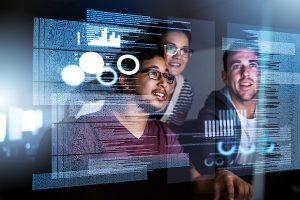Almost every university uses a learning management system (LMS). Think of a learning management system as the software infrastructure or the online website that delivers the “stuff” of a particular course. An LMS can be used to present content, provide information, and manage administrative duties. It may be helpful at tracking enrollments, attendance and grades. The approach of an LMS often emphasizes technology – it is a “management” system. What a Learning Management System does not often emphasize is facilitating learning.
In contrast, there is another approach, a “Digital Learning Environment” (DLE). This approach is also known as “The Next Generation Digital Learning Environment” (NGDLE). The scope no longer contains a single application – but an ecosystem that supports higher education. Multiple technologies and services meet a variety of learning needs with a greater emphasis on flexibility. It should be less a “one size fits all” but a set of tools based on common standards.
The University of Wisconsin System is also moving away from an LMS and towards a DLE. The approach should be against the implementation of a required technology solution, but more in favor of creating a flexible set of services and tools that support teaching and learning.
To quote the University of Wisconsin System DLE strategy:
Our DLE is not a learning management system (LMS). Rather, our DLE is a federated, online environment that includes services and tools purposefully brought together to support the needs of teaching and learning in all modes (i.e., face-to-face, blended/hybrid, and fully online). Our DLE challenges the traditional role of an LMS as “the” platform for managing course documents, quizzes, videos, and the like. By shifting our perspective from an LMS-based content platform, to a “digital environment” that creates information we can act upon, UW System can then realize the many benefits of an interoperable suite of services and tools that allow us to maximize student access and success. https://www.wisconsin.edu/dle/strategy/
This allows the UW system to integrate tools through a common platform while creating and easy point of entry, a secure sign-on leveraging our “federated” identity, and services that communicate to each other while ensuring appropriate security and privacy. Instructors will have the freedom to apply these tools to their teaching to support their students learning.

next generation digital learning can take many forms.
Underlying this belief are five key characteristics that define the UW System Digital Learning Environment. I will explore these characteristics in more detail in the coming weeks as part of this blog. For now, I want to introduce the characteristics as the drivers behind the project.
- Accessibility and the principles of universal design are fundamental, so that all students, regardless of ability and learning preference, can succeed in all instructional modes.
- Provides a platform to support learning and administrative analytics, readiness and learning assessment, progress mapping, advising, and “early alerts” to trigger interventions to ensure student success.
- Collaboration is expected, encouraged, and supported among those within and outside the institution.
- Components are interoperable; meaning they are standards-based and work together seamlessly, not stapled together to sit side-by-side.
- The environment is student-centered, and allows for a personalized experience for the student with regard to both content and pathways.
Within this Digital Learning Environment, a platform presents content. The University of Wisconsin System has chosen Canvas Instructure as that main platform. Canvas is envisioned as the main tool “hub.” The emphasis is on creating a seamless, consistent, and accessible student experience. Canvas integrates additional tools and services. Tools and services are currently being evaluated for inclusion and integration within this environment.
In summary, a Digital Learning Environment (DLE) emphasizes pedagogy that then allows for the adoption of technology that supports teaching and learning. Instead of being a single monolithic technology, you can personalize instruction through the set of tools and services to meet your course needs. A DLE supports face-to-face and online courses. This approach imagines The Next Generation Digital Learning Environment as both an ecosystem and a mind-set. The DLE supports accessibility, analytics, collaboration, interoperability, in a personalized experience.
– Ted Witt
Next Week: What is the status of the Canvas migration project here at the University of Wisconsin Whitewater?
REFERENCES:
https://www.wisconsin.edu/dle/strategy/
https://library.educause.edu/resources/2015/4/the-next-generation-digital-learning-environment-a-report-on-research
https://news.continuingstudies.wisc.edu/are-you-ready-for-the-next-generation-digital-learning-environment/
https://library.educause.edu/~/media/files/library/2015/12/eli7127-pdf.pdf
https://library.educause.edu/resources/2015/12/7-things-you-should-know-about-ngdle




 The start of the Fall 2018 Semester is fast approaching, and I just wanted to highlight some important information about Turning Point.
The start of the Fall 2018 Semester is fast approaching, and I just wanted to highlight some important information about Turning Point.
